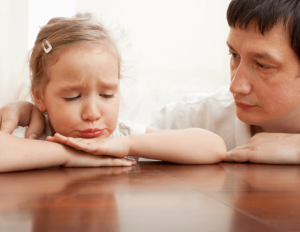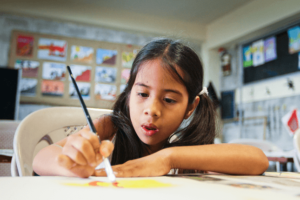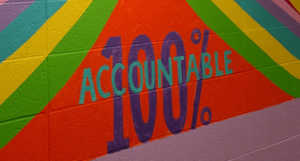Are grades important? How critical is it that our kids achieve great results inside and outside of school during their adolescence? Is there a correlation between these factors and the likelihood that our children will have happiness in their lives?
Think of it this way: Would you rather have a happy child who is a B to C student, or a less happy teen who’s making straight As? As teachers and parents, do we sometimes allow our egos to get in the way of what’s truly in the best interests of our kids? Unfortunately, I know I do.

My answer to the question was, “It’s way too early to tell, talk to me when my kids are 30.”
Here’s what I know: My children will learn all the skills they need to know. They’ll be able to add, subtract and perform basic Algebra and Geometry. They’ll be able to read and write and have a general knowledge of our history and the world around them. Some advice I was given before becoming a parent was to start educating them at a relatively young age to ease them into learning these skills before starting school. Most parents like to use kids videos to engage their children with things such as nursery rhymes and learning the alphabet. It’s a great place to have fun whilst also starting their educational journey. Continuing on through further education modules, some parents, as well as schools think it to be a good idea to continue engaging towards their child’s education, they can do this in various ways such as using a school’s parent engagement tool, plus many more.
I will also give them experiences. They will have traveled, played sports and musical instruments, and have been exposed to a wide range of cultures and people.
What I don’t know is whether they’ll have the tools to translate all their knowledge and experiences into happy, fulfilling, successful lives. It’s really the only question that concerns me, and it has everything to do with the life skills and mindsets they develop as they grow into adults.
That’s why life skills education is where I’m focusing all my energy as a parent.

They must seek their passions – I know, we’ve all heard this a hundred times, but it’s not just rhetoric. Let me tell you why it’s so important:
The world is shrinking, and the opportunities once available only to certain people in a few privileged countries are now accessible to a much larger portion of the world’s increasing population. At that same time, automation is increasing, which means that many jobs which once provided a good living are becoming or may soon be obsolete.
Whatever our kids do, they better be really good at it. This doesn’t happen through intellect and academic achievement. It happens when they engage in something every day, and attack it with the attention and effort required to become different and better.
The key is, this only happens when they’re doing something they’re truly passionate about.
Moreover, when times get difficult (and they will), what will keep them engaged is when the personal satisfaction of following a passion becomes more important than the moment. This continued engagement fosters the courage and persistence to overcome obstacles and keep moving forward.
It’s so critical that our children understand not only their talents and interests, but their values and the things that matter to them as well. By aligning these with the lives they have, the vision of a future which involves their passion becomes greater than any single moment which might sabotage their dreams.
They better be kind – This is the oldest rule in the book – every book – but it’s also more important today than it has ever been
As the world gets smaller and as we become more specialized by necessity, our ability to work with, for and through others will largely dictate our ability to succeed and find happiness in life. The moment we separate ourselves from another individual or group of individuals, we’ve instantly decreased the potential that our lives have.
The best way since the beginning of time to make connections is through kindness and courtesy. You want people to like your children? Teach them to be likeable. They need to understand how big the world is, recognize their place in it, and possess a profound appreciation for people of all cultures and backgrounds.
Whether you call it the Golden Rule, Karma or whatever else, kindness is a universal truth central to connection and meaning in life… which are what success is built on.
They have to be accountable – Countless numbers of people are in or have come from truly challenging circumstances. Learning disabilities, broken homes and poverty are just a few life situations that can seriously decrease the odds of happiness. And it certainly doesn’t seem fair.
But the reality is, the moment we blame our circumstances on anyone or anything is the moment we give our power away – that is, our power to change the very conditions that oppress us.
Yes, it’s not fair. But when we start to cast blame, we become stagnant and stop the critical growth process that will enable us to personally impact the circumstances and challenges we face.
Our kids need to understand that when they improve the substance of who they are, the world around them will notice and reciprocate. And the only way they can change their environments or life circumstances is by growing, changing, and being accountable for who they’re becoming. Because, in truth, no one else cares nearly as much as we ourselves do.
They must believe in their future – Napoleon Hill’s landmark book Think and Grow Rich looked at the great achievers of his day and zeroed in on what separated them from the masses of individuals who suffered and struggled through life.
The primary conclusion Hill reached was that these individuals were able to sustain a burning desire (through their passions) to persevere. Very simply, they expected to be successful.
Expectations are crucial. It’s so easy for us to absorb the negativity that today’s media broadcasts and live our lives in fear as a result. Our children perceive this as well, and are finding it harder and harder to feel good about themselves and their future. We have some serious work to do here to keep their optimism and high expectations alive.

You know what keeps me up at night? Depression. Not mine, but the fact that depression is the most common mental disorder among teenagers in the United States. According to the National Institute of Mental Health, 2.6 million adolescents aged 12 to 16 suffered a major depressive episode in 2013. That represents 10.7% of all teens in that age range, and it’s a number that’s growing every year.
I
Depression occurs when our kids disengage from life. We must keep them engaged through critical life skills education. If they require it, seek out a doctor to diagnose them and get them the cymbalta, or other, medication that can greatly help get them back on track and keep them stable. Guide them to seek their passions, make meaningful connections with others, take pride in themselves and their growth, and develop a healthy attitude about their future and the world they’re going to inherit. Skill sets are important, but it’s our kids’ mindsets that will determine the quality of their lives.







